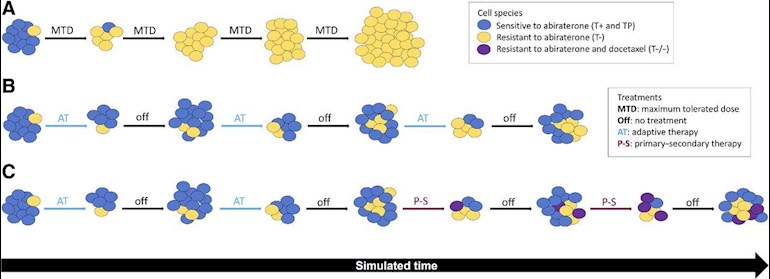This is a multipart post. The part herein is a general introduction to the concept of Adaptive Therapy as it applies to the treatment of cancer. The subsequent post(s) is(are) about recent research efforts that model the theory and provide clinical evidence of it's efficacy for PCa.
Linked below is a Jan 2020 article in the WSJ that gives a good non-technical overview of Adaptive Theory (AT) that was developed by Dr. Robert Gatenby. Also linked is an earlier 2019 article in Wired that profiles the work of Dr. Gatenby in greater deatil, first at Fox Chase in Philadelphia, Arizonia University, and since 2007 at the H. Lee Moffitt Cancer Center in Tampa, Florida. Dr Gatenby is the major trail-blazing pioneer in the development of AT and is using it to treat appropraite patients at Moffitt.
I think some form of AT is being done by a lot of cancer patients without them even realizing it. In fact, up until I first found out about adaptive therapy several years back, I was inadvertently doing a form of it with my ever-changing supplement regime. That was partly due to the availability of better research on supplements and the advent of my second cancer, creating a need to expand my self-directed complementary interventions to affect them both.
Those reasons have caused me to frequently change combinations and dosages of supplements year in and out. Since I got my first cancer diagnosis (CLL) back in 2006, I have been at this for 15 years now, so the range of modifications to my diet, lifestyle, and supplement regimes has been quite wide over that period of time. There is no way of knowing if any of this has had any significant influence on my inexplicably better than expected outcomes for both cancers. But AT could easily be at work at some level.
Circumstantially, I also am doing a n=1 trial on PCa SOC, as I have done a single ADT treatment and been off treatment and < 0.1 undetectable (0.02 new nadir last year) for over 3 1/2 years. So, even with SOC, I am practicing a form of Adaptive Therapy; i.e., with no "induction period", my early ADT vacation is definitely not SOC - even for IADT). Time will tell whether my extended vacation is durable or fleeting, but at 73 years old, I am comfortable with my decision to put QOL above the "promise" of better long-term outcomes with SOC continuous treatment. (with the many debilitating side effects that go with it.)
Those of us who have had cancer for many years and seen its effect up-close in family and friends know that each of us walks our own individual road when it comes to how and when to treat it. Most cancer centers follow the same or similar rulebook. My departure from the SOC rulebook was due to a inadvertent lapse at my treatment center.
That lapse opened up the opportunity for me to explore a path that now seems a logical possible option for ADT "good responders". In my case the ADT was the bicaludamide 4-week "flash-bridge" to a 3 mo Lupron depot. With an excellent response at the end of 3 months, I made the decision to see see what T and PSA looked like after 3 mos off ADT. At the end of the single 3-mo treatment period, my T was 9 and PSA was <0.1 undetectable, down from 25.5 just prior to starting ADT. Following my 3-mo treatment vacation, PSA remained <0.1 undetectable and T had risen to a post-diagnostic high of 586! (Note: If my PSA HAD risen above my treatment center's <0.1 "undetectable" level, I would still have had the option of repeating the cycle again or doing a full induction cycle. Either way, it is unlikely that in that amount of time the cancer would be out of control - vs the possibility of the 3 1/2 + year extended vacation I have had.)
In summary, my experience would seem to provide n=1 evidence that "good responders" are risking driving their cancer to CR with continuous ADT (and often being miserable in the process), when in fact they could get by with lengthy (in my case, multi-year) vacations while maintaining normal T levels and excellent QOL. Embracing AT as an approach to cancer treatment, would offer some subset of PCa patients the options of challenging their cancer without pushing it to early CR status. Readers here should note that I am NOT suggesting this is a sound strategy for patients with metastatic disease or aggressive pathology (altho' my profile is pretty aggressive), but rather that it is a strategy that seems to embrace the concept of AT from the start of treatment and offers an option for some percentage of patients to retain a QOL that is closer to that of an untreated man for indefinite periods of time.
Here is a link to the WSJ article (The quote below from the article, which refers to the use of AT in pest management, may unfortunately summarize where we are in our approach to cancer management today):
* * *
“I think pest managers are about 30 years ahead of the oncologists,” said Carlo Maley, an evolutionary cancer biologist at Arizona State University and director of the new Arizona Cancer Evolution Center."
* * *
A New Approach to Cancer Treatment Draws Lessons From Darwin ‘Adaptive therapy’ uses principles of evolution to try to manage cancer as a chronic condition - By Brainna Abbott - Jan. 7, 2020 **
wsj.com/articles/a-new-appr...
** If the WSJ link blocks access to full article, try this alternative link
pressreleasepoint.com/new-a...
And here is the must-read lengthier Wired article about Dr. Gatenby's work:
A Clever New Strategy for Treating Cancer, Thanks to Darwin - by Roxanne Khamsi - 03.25.2019
wired.com/story/cancer-trea...
Stay Safe & Well - and Be Darwinesque Adaptive in your life and the way you think about your cancer.
Ciao - Capt'n K9


